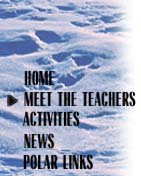
|
Oral History Project July 2002 Wales, AlaskaThis project began in July 2002. Four students from the Butterfield School, Orange, MA researched and interviewed six people from Wales, Alaska. This project began while I worked on my second field season with Dr. Roger Harritt, from the University of Alaska, at Anchorage (ENRI, Environmental and Natural Resource Institute). A discussion with Dr. Harritt led to these interviews. They were set up prior to going to Wales, at the end of May and beginning of June. Four students were selected, Julia Paoletti, Olive Moore, Chris Hudacek, and Jillian Waters. We met weekly, brainstormed, and came up with many questions. All of the students practiced! We discussed interviewing techniques, kinds of questions to be asked, and paid special attention to culture. We did not want to ask any questions that might seem offensive as a result of cultural differences. Oral history is important because it preserves the past. Oral history teaches us, informs us, and relates stories of a people, a tradition, and a way of life for a group of people. It preserves history. In the case of Wales, this project recorded the people and traditions of Wales, Alaska. The Inupiaq live a subsistence life style today. They follow their ancestors. They have hunted for thousands of years. They have passed their heritage and culture down to their sons and daughters and are very proud of their way of life. While in Wales this past summer, I phoned the students and then via conference call, they then interviewed 6 people, one young person and 5 elders from the village. These interviews were taped and given to the students in August. They then wrote up the interviews, and applied them to a Power Point presentation. The next stage of the project was to present to two classrooms at Butterfield School.Following the presentation, they presented again for the public. The stories follow:
This program would not be possible without the support of Dr. Roger Harritt of the University of Alaska, at Anchorage, ENRI (Environmental and Natural Resource Institute). |
